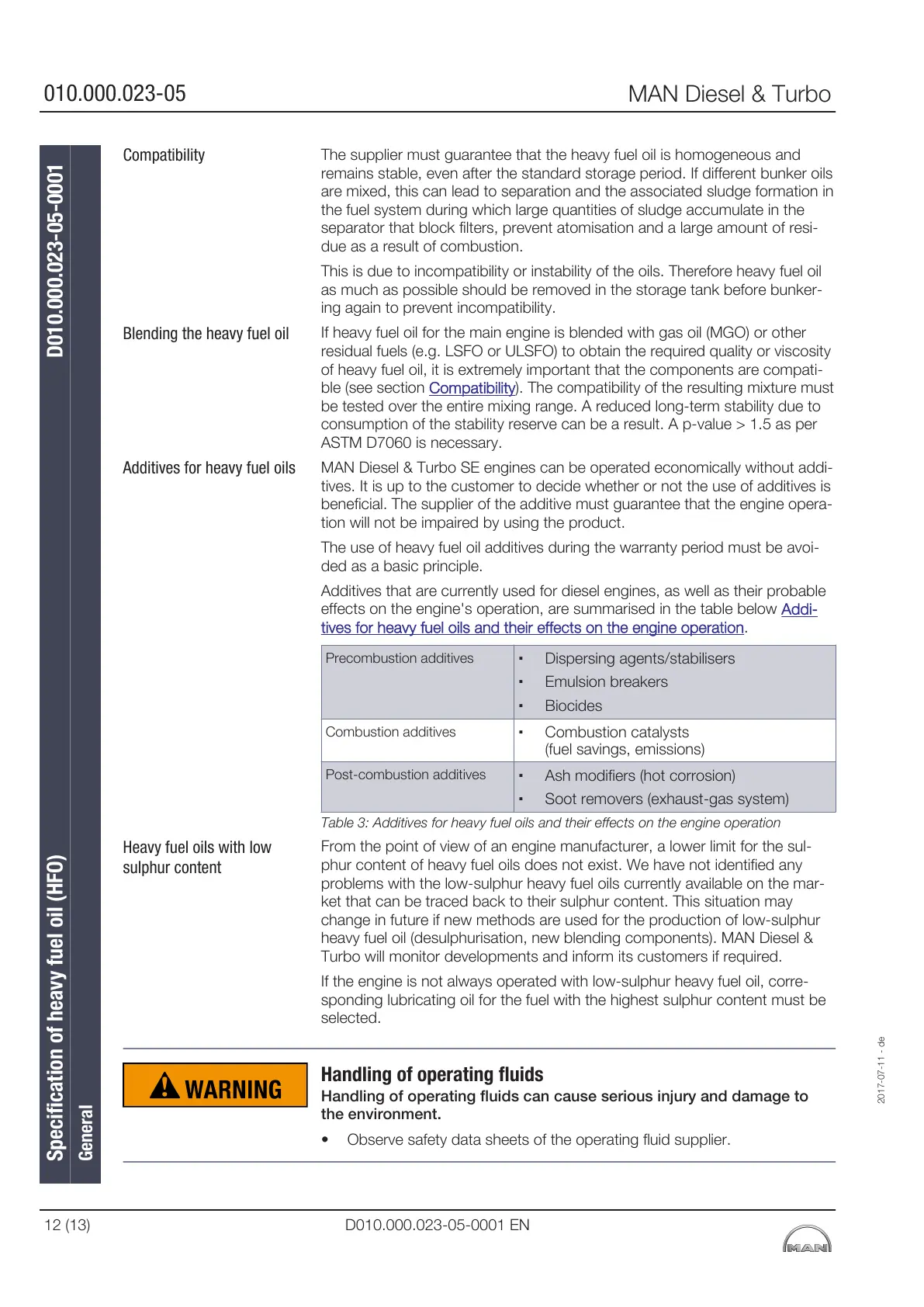The supplier must guarantee that the heavy fuel oil is homogeneous and
remains stable, even after the standard storage period. If different bunker oils
are mixed, this can lead to separation and the associated sludge formation in
the fuel system during which large quantities of sludge accumulate in the
separator that block filters, prevent atomisation and a large amount of resi-
due as a result of combustion.
This is due to incompatibility or instability of the oils. Therefore heavy fuel oil
as much as possible should be removed in the storage tank before bunker-
ing again to prevent incompatibility.
If heavy fuel oil for the main engine is blended with gas oil (MGO) or other
residual fuels (e.g. LSFO or ULSFO) to obtain the required quality or viscosity
of heavy fuel oil, it is extremely important that the components are compati-
ble (see section Compatibility). The compatibility of the resulting mixture must
be tested over the entire mixing range. A reduced long-term stability due to
consumption of the stability reserve can be a result. A p-value > 1.5 as per
ASTM D7060 is necessary.
MAN Diesel & Turbo SE engines can be operated economically without addi-
tives. It is up to the customer to decide whether or not the use of additives is
beneficial. The supplier of the additive must guarantee that the engine opera-
tion will not be impaired by using the product.
The use of heavy fuel oil additives during the warranty period must be avoi-
ded as a basic principle.
Additives that are currently used for diesel engines, as well as their probable
effects on the engine's operation, are summarised in the table below
Addi-
tives for heavy fuel oils and their effects on the engine operation.
Precombustion additives
▪ Dispersing agents/stabilisers
▪ Emulsion breakers
▪ Biocides
Combustion additives
▪ Combustion catalysts
(fuel savings, emissions)
Post-combustion additives
▪ Ash modifiers (hot corrosion)
▪ Soot removers (exhaust-gas system)
Table 3: Additives for heavy fuel oils and their effects on the engine operation
From the point of view of an engine manufacturer, a lower limit for the sul-
phur content of heavy fuel oils does not exist. We have not identified any
problems with the low-sulphur heavy fuel oils currently available on the mar-
ket that can be traced back to their sulphur content. This situation may
change in future if new methods are used for the production of low-sulphur
heavy fuel oil (desulphurisation, new blending components). MAN Diesel &
Turbo will monitor developments and inform its customers if required.
If the engine is not always operated with low-sulphur heavy fuel oil, corre-
sponding lubricating oil for the fuel with the highest sulphur content must be
selected.
Handling of operating fluids
Handling of operating fluids can cause serious injury and damage to
the environment.
• Observe safety data sheets of the operating fluid supplier.
Compatibility
Blending the heavy fuel oil
Additives for heavy fuel oils
Heavy fuel oils with low
sulphur content
Specification of heavy fuel oil (HFO) D010.000.023-05-0001
General
2017-07-11 - de
010.000.023-05
MAN Diesel & Turbo
12 (13) D010.000.023-05-0001 EN

